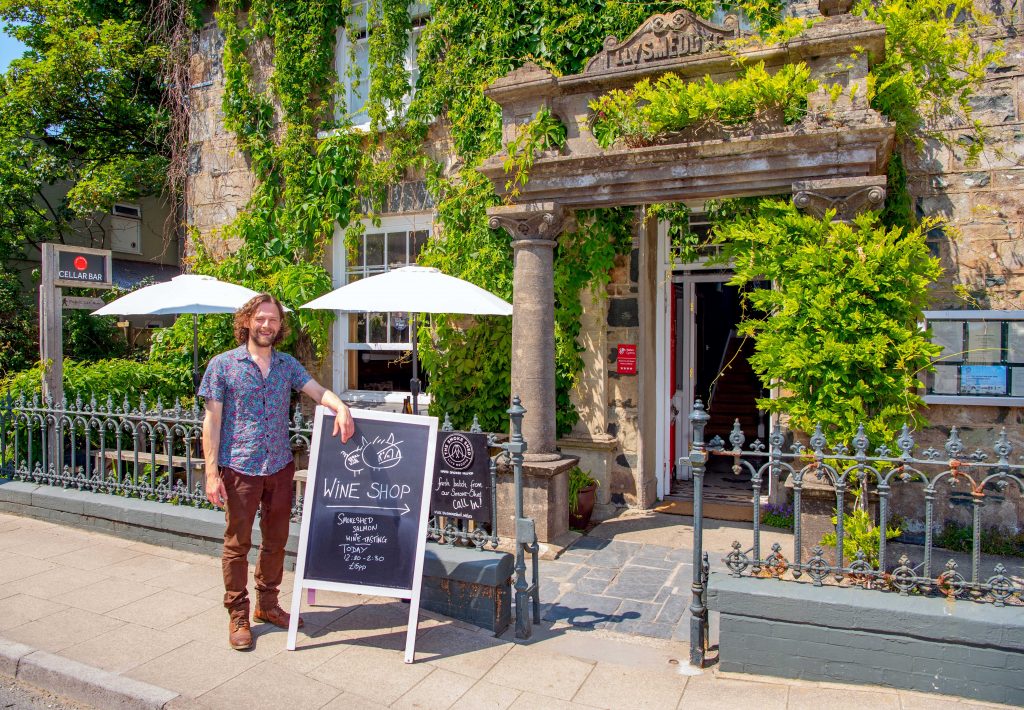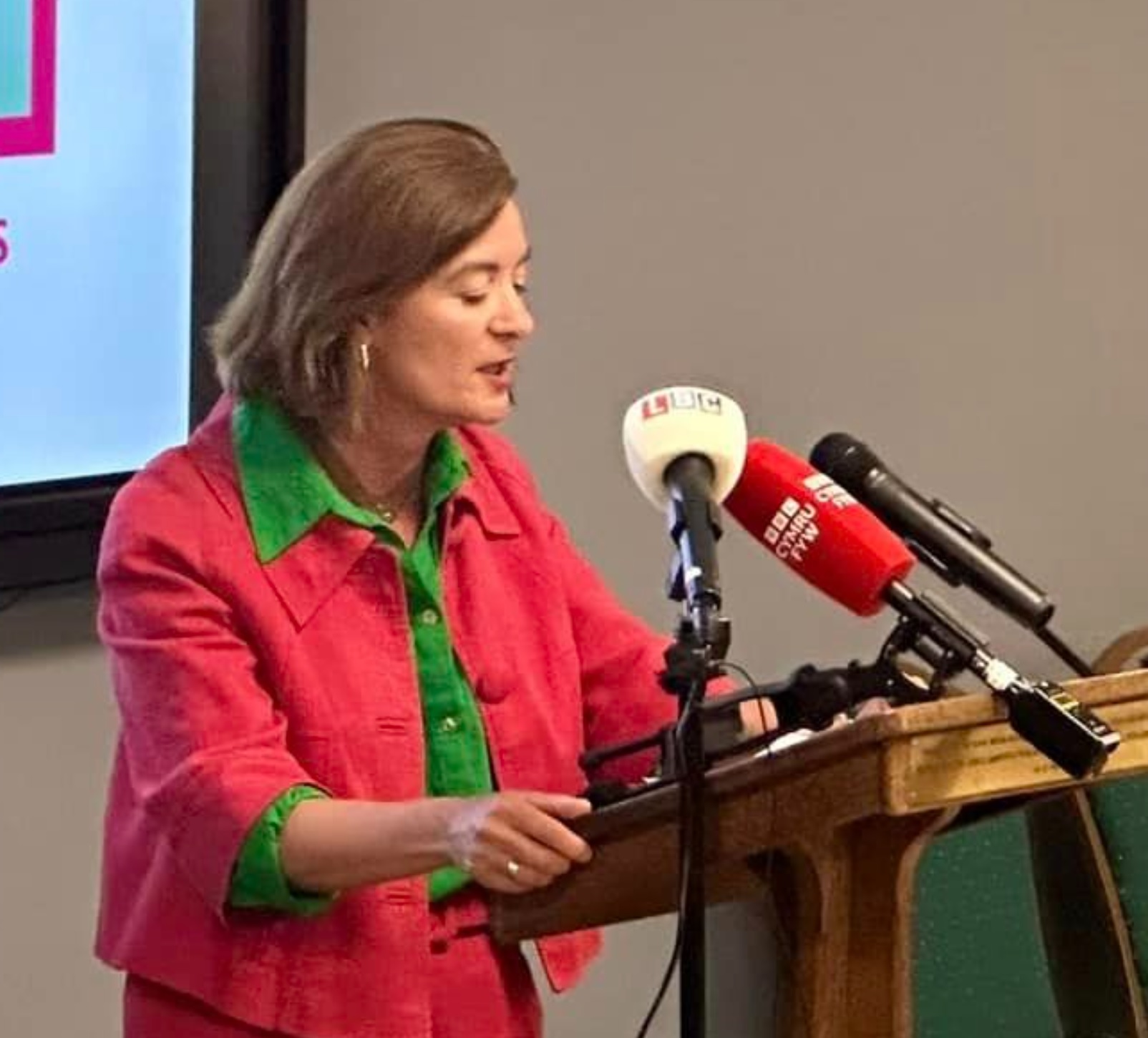Business
Start up loan helps independent wine shop in Pembrokeshire open its doors

A WINE shop selling locally produced Welsh wine has opened its doors on the grounds of acclaimed boutique hotel, Llys Meddyg in Newport, Pembrokeshire, thanks to British Business Bank funding.
Feral Pig Wines has been established by trained sommelier and former restaurant manager at Llys Meddyg, Dave Cushley (40), building on his 17 years’ experience working in hospitality across the UK as front-of-house and restaurant manager.
The shop sells a range of locally and sustainably produced wine from Wales, including Narberth-based Velfrey Vineyard and Carmarthenshire-based Hebron Vineyard, as well as an array of wines from smaller-scale producers across the world including Artisans Vignerons from Naoussa, Greece; Podere Canalino from Montalcino, Italy; Marcio Lopes from Vinho Verde, Portugal and De Sante from Napa Valley, USA.
Dave said: “I’ve set out to try and provide something unique, not only in the bottles we sell, but also the experience and story that comes with it. Our wine isn’t found in your local supermarkets, our stock is made up of much smaller scale, sustainably and organically produced wines and spirits, including those from just down the road in Pembrokeshire and elsewhere in Wales.

“Some people might wonder where the unusual name ‘Feral Pig Wines’ comes from. It follows the notion that a feral pig was once a domesticated pig that has gone wild. Feral pigs are known to eat and destroy everything it lays its eyes on – including a vineyard. The idea that feral pigs could be wine pests resonated with me, I’d like to think the name is somewhat of a self-portrait.”
The business received a £10,000 Start Up Loan from the British Business Bank in February 2023.
“The British Business Bank loan provided the funds I needed to be able to get my business up and running”, said Dave. “The cost of the stock itself came to half of the amount alone, so put simply, without the financial backing I just wouldn’t have been able to get Feral Pigs Wine off the ground.”
As Pembrokeshire gears up for another busy summer season and footfall continues to increase, Dave intends to employ a couple of local people to help assist in the shop so he can focus on running other elements of the business including wholesale and consultancy.

Alongside this, Dave runs an online service for Feral Pig Wines, offering UK-wide delivery of wine boxes. And locally, he’s partnering with holiday lets and guest houses in the area to provide deliveries, something Dave hopes will be a popular service as tourism increases throughout the summer.
Feral Pig Wines is also host to weekly tasting nights, where customers can try an array of different wines and learn about their origins.
The British Business Bank Start Up Loans programme provides government backed loans of up to £25,000 per individual, up to a maximum of £100,000 per business, facilitated through delivery partners in Wales like Business in Focus based in Bridgend. In addition to finance, successful applicants receive free mentoring, access to resources and advice.
Jess Phillips, Senior Manager for Wales at the British Business Bank said: “Feral Pig Wines, a concept fuelled by experience and passion, is exactly why we support small businesses through our Start Up Loans programme.
“Dave’s business not only brings something new to the market in Pembrokeshire, but also supports sustainability and local producers in Wales. We wish Dave all the best for the future of his business.”
Business
Bid to convert office space into chocolate factory, salon and laundrette

A CALL for the retrospective conversion of office space previously connected to a Pembrokeshire car hire business to a chocolate factory, a beauty salon and a laundrette has been submitted to county planners
In an application to Pembrokeshire County Council, Mr M Williams, through agent Preseli Planning Ltd, sought retrospective permission for the subdivision of an office on land off Scotchwell Cottage, Cartlett, Haverfordwest into three units forming a chocolate manufacturing, a beauty salon, and a launderette, along with associated works.
A supporting statement said planning history at the site saw a 2018 application for the refurbishment of an existing office building and a change of use from oil depot offices to a hire car office and car/van storage yard, approved back in 2019.
For the chocolate manufacturing by ‘Pembrokeshire Chocolate company,’ as part of the latest scheme it said: “The operation comprises of manufacturing of handmade bespoke flavoured chocolate bars. Historically there was an element of counter sales but this has now ceased. The business sales comprise of online orders and the delivery of produce to local stockist. There are no counter sales from the premises.”
It said the beauty salon “offers treatments, nail services and hairdressing,” operating “on an appointment only basis, with the hairdresser element also offering a mobile service”. It said the third unit of the building functions as a commercial laundrette and ironing services known as ‘West Coast Laundry,’ which “predominantly provides services to holiday cottages, hotels and care homes”.
The statement added: “Beyond the unchanged access the site has parking provision for at least 12 vehicles and a turning area. The building now forms three units which employ two persons per unit. The 12 parking spaces, therefore, provide sufficient provision for staff.
“In terms of visiting members of the public the beauty salon operates on an appointment only basis and based on its small scale can only accommodate two customers at any one time. Therefore, ample parking provision exists to visitors.
“With regard to the chocolate manufacturing and commercial laundrette service these enterprises do not attract visitors but do attract the dropping off laundry and delivery of associated inputs. Drop off and collections associated with the laundry services tend to fall in line with holiday accommodation changeover days, for example Tuesday drop off and collections on the Thursday.
“With regard to the chocolate manufacturing ingredients are delivered by couriers and movements associated with this is also estimated at 10 vehicular movements per week.”
The application will be considered by county planners at a later date.
Business
First Minister criticised after ‘Netflix’ comment on struggling high streets

Government announces 15% support package but campaigners say costs still crushing hospitality
PUBS, cafés and restaurants across Wales will receive extra business rates relief — but ministers are facing criticism after comments suggesting people staying home watching Netflix are partly to blame for struggling high streets.
The Welsh Government has announced a 15% business rates discount for around 4,400 hospitality businesses in 2026-27, backed by up to £8 million in funding.
Announcing the package, Welsh Government Finance Secretary Mark Drakeford said: “Pubs, restaurants, cafés, bars, and live music venues are at the heart of communities across Wales. We know they are facing real pressures, from rising costs to changing consumer habits.
“This additional support will help around 4,400 businesses as they adapt to these challenges.”
The announcement came hours after Eluned Morgan suggested in Senedd discussions that changing lifestyles — including more time spent at home on streaming services — were contributing to falling footfall in town centres.
The remarks prompted political backlash.
Leader of the Welsh Liberal Democrats, Jane Dodds, said: “People are not willingly choosing Netflix over the high street. They are being forced indoors because prices keep rising and wages are not.
“Blaming people for staying at home is an insult to business owners who are working longer hours just to survive.”
Industry groups say the problem runs deeper than consumer behaviour.
The Campaign for Real Ale (CAMRA) welcomed the discount but warned it would not prevent closures.
Chris Charters, CAMRA Wales director, said: “15% off for a year is only the start. It won’t fix the unfair business rates system our pubs are being crushed by.
“Welsh publicans need a permanent solution, or doors will continue to close.”
Across Pembrokeshire, traders have repeatedly told The Herald that rising energy bills, wage pressures and rates — rather than a lack of willingness to go out — are keeping customers away.
Several town centres have seen growing numbers of empty units over the past year, with independent shops and hospitality venues reporting reduced footfall outside the main tourist season.
While ministers say the relief balances support with tight public finances, business groups are calling for wider and longer-term reform.
Further debate on rates changes is expected later this year.

Business
Pub rate relief welcomed but closures still feared

CAMRA warns one-year discount is only a sticking plaster as many Welsh locals face rising bills
A BUSINESS rates discount for Welsh pubs has been welcomed as a step in the right direction — but campaigners warn it will not be enough to stop more locals from shutting their doors.
The Campaign for Real Ale (CAMRA) says the Welsh Government’s decision to offer a 15 per cent reduction on business rates bills for the coming year will provide short-term breathing space for struggling publicans.
However, it believes the move fails to tackle deeper problems in the rating system that continue to pile pressure on community pubs across Wales, including in Pembrokeshire and Carmarthenshire.
Chris Charters, Director of CAMRA Wales, said: “Today’s announcement from the Finance Secretary that pubs will get 15% discount on their business rates bills is a welcome step.
“However, many pubs still face big hikes in their bills due to the rates revaluation which could still lead to more of our locals in Wales being forced to close for good.
“15% off for a year is only the start of supporting pubs with business rates. It won’t fix the unfair business rates system our pubs are being crushed by.”
He added: “Welsh publicans need a permanent solution, or doors will continue to close and communities will be shut away from these essential social hubs that help tackle loneliness and isolation.”
Mounting pressure on locals
Under plans announced by the Welsh Government, pubs will receive a temporary discount on their rates bills for the next financial year.
But CAMRA argues that many premises are simultaneously facing sharp increases following the latest revaluation, which recalculates rateable values based on property size and trading potential.
For some smaller, rural venues, especially those already operating on tight margins, the increases could wipe out the benefit of the relief entirely.
Publicans say they are also contending with rising energy costs, higher wages, supplier price hikes and changing customer habits since the pandemic.
In west Wales, several long-standing village pubs have either reduced their opening hours or put their businesses on the market in the past year, with landlords warning that overheads are becoming unsustainable.
Community role
Campaigners stress that the issue goes beyond beer sales.
Pubs are often described as the last remaining social spaces in small communities — hosting charity events, sports teams, live music and local groups.
In parts of rural Pembrokeshire, a pub can be the only public meeting place left after the loss of shops, banks and post offices.
CAMRA says supermarkets and online retailers enjoy structural advantages that traditional pubs cannot match, making it harder for locals to compete on price.
The organisation is now calling on ministers to introduce a permanently lower business rates multiplier for pubs, rather than relying on short-term discounts.
Long-term reform call
CAMRA wants whoever forms the next Welsh administration to commit to fundamental reform of the rating system, arguing that pubs should be recognised as community assets rather than treated like large commercial premises.
Without change, it warns, the number of closures is likely to accelerate.
Charters said: “This is about protecting the future of our locals. Once a pub shuts, it rarely reopens. We can’t afford to lose any more.”
For many communities across west Wales, the fear is simple: temporary relief may buy time — but it may not be enough to save the local.
-

 Health6 days ago
Health6 days agoConsultation reveals lack of public trust in health board
-

 News1 day ago
News1 day agoPrincess of Wales visits historic Pembrokeshire woollen mill
-

 Crime5 days ago
Crime5 days agoPembroke man accused of child sex offences sent to Swansea Crown Court
-

 Community6 days ago
Community6 days agoCampaign to ‘save’ River Cleddau hits over 2,200 signatures
-

 Health3 days ago
Health3 days agoDoctor struck off after sexual misconduct findings at Withybush Hospital
-

 News7 days ago
News7 days agoWelsh Conservatives push for reversal of 20mph limit and major road spending
-

 Health7 days ago
Health7 days agoAmbulance called after ‘drop of mouthwash’ swallowed as 999 abuse highlighted
-

 Crime5 days ago
Crime5 days agoManhunt intensifies after woman seriously injured in Carmarthen park stabbing





































